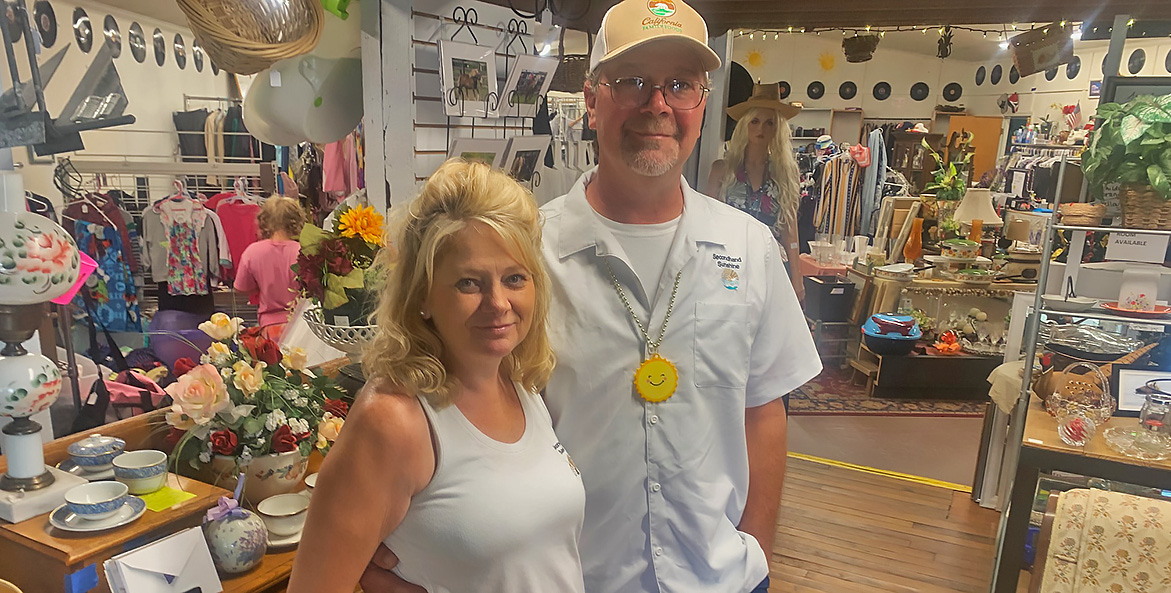Amber Whaley is on a mission. “It feels like you’re helping people and the environment,” she says of her passion for upcycling. “It’s upsetting to see things thrown in the dumpster or landfill when they could be donated, repaired, reused, or sold.” In early 2022, Whaley opened Secondhand Sunshine on Chincoteague Island and quickly the store has become a community go-to for reusing and upcycling a kaleidoscope of items. “We have all kinds of shoppers and try to appeal to all ages,” she explains. You can pick through books, paintings, carvings, dishware, clothes for babies on up, vinyl, glassware, microwaves, rocking chairs, jewelry, tables, pots and pans, and so much more.
In 2018, the last time the Environmental Protection Agency released data on municipal solid waste (AKA “trash” or “garbage”), Americans generated 4.9 pounds of trash per person per day, totaling a staggering 292 million tons of trash for the year. Sixty-two percent of solid waste winds up in landfills or is incinerated. Despite the volume of garbage that’s accumulating, many want to reduce waste. Online Freecycling and EPA’s Reduce, Reuse, Recycle programs are among myriad ways to learn to reduce waste. Another big ally in the quest to reduce garbage per person per day? Thrift shops.
Driven by a duty to reduce waste can make Whaley often appear zealous, like when she drove to work one day and saw a SUV in front of her packed with belongings turning into the dump. Whaley followed. Before the driver emptied the contents into the dump, Whaley pleaded: “Please follow me; I have a thrift store close by.”
Mommom instilled the idea that it makes sense to share what others might need and replenish with what you need. Keep moving it rather than reflexively throw out and buy new.
Whaley’s grandmother played an integral role in igniting Whaley’s passion for reducing waste. “Growing up, Mommom took me to little towns in Virginia to explore thrift stores. Sometimes we had money, sometimes not. We’d just look around. On Mommom’s birthday, all she wanted was to have a family breakfast and go thrifting. Mommom instilled the idea that it makes sense to share what others might need and replenish with what you need. Keep moving it rather than reflexively throw out and buy new. Mommom inspired her whole family to reuse, donate, and not to throw anything away.”
Like her Mommom and her mom, Whaley’s father sought a simple life that didn’t waste anything. A waterman and gardener, he “respected the land and the water” and provided much of the family’s food while reusing bags, tools, baskets, milk cans, and the like. “Simplifying and not producing garbage is normal for me,” says Whaley. “I cringe when I see unnecessary waste. Why throw something out if you can fix it and someone else can use it?!”
The island community appears to be rallying around recycling. Whereas locals and vacationers used to prop items by a dumpster, the county’s new covered “Put and Take Area” is flourishing as an informal swap of still-usable goods, whether a vacuum or set of drawers. A church thrift store maintains a regular clientele. Restaurants recycle oyster shells. And Whaley is thrilled at the network of upcyclers tapping into her store to transform materials—from frames to dated jewelry to battered chairs—into eye-popping art or handsome furniture.
Customers come in with their sights on re-do projects small and large. “I like how people take something used and make it their own.” The examples abound: a couple redid a beat-up vanity for a granddaughter; another customer bought a magazine rack and transformed it into storage for baking pans and trays; another woman buys and reworks broken jewelry into pieces of art. “People are excited to show what they’ve done with what would have been put in the landfill,” says Whaley.
These days Secondhand Sunshine is a family affair. In May, Whaley’s husband Skip retired and now works in the store. Each morning, he posts pictures and details of recent arrivals or upcoming sales on Facebook. And Whaley’s three sons and two younger daughters are all supportive of her calling.
“Mommom passed away in 2018. She’s not here. But she is here. I can feel her. She’s helping,” Whaley says. “I love this store. I love making people happy—helping them find things they need and can afford. And things aren’t going to the dump! Customers say ‘thank you,’ but I’m thanking them. It’s full circle for me.”
According to Environment America, Americans make up 4 percent of the world’s population but produce about 12 percent of the world’s garbage. And much of that junk lands in landfills and in our waters.
Thinking “full circle” rings like a watchword for our times.



